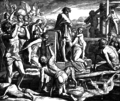Portal:Cities
The Cities Portal

A city is a human settlement of a notable size. The term "city" has different meanings around the world and in some places the settlement can be very small. Even where the term is limited to larger settlements, there is no universally agreed definition of the lower boundary for their size. In a more narrow sense, a city can be defined as a permanent and densely settled place with administratively defined boundaries whose members work primarily on non-agricultural tasks. Cities generally have extensive systems for housing, transportation, sanitation, utilities, land use, production of goods, and communication. Their density facilitates interaction between people, government organizations, and businesses, sometimes benefiting different parties in the process, such as improving the efficiency of goods and service distribution.
Historically, city dwellers have been a small proportion of humanity overall, but following two centuries of unprecedented and rapid urbanization, more than half of the world population now lives in cities, which has had profound consequences for global sustainability. Present-day cities usually form the core of larger metropolitan areas and urban areas—creating numerous commuters traveling toward city centres for employment, entertainment, and education. However, in a world of intensifying globalization, all cities are to varying degrees also connected globally beyond these regions. This increased influence means that cities also have significant influences on global issues, such as sustainable development, climate change, and global health. Because of these major influences on global issues, the international community has prioritized investment in sustainable cities through Sustainable Development Goal 11. Due to the efficiency of transportation and the smaller land consumption, dense cities hold the potential to have a smaller ecological footprint per inhabitant than more sparsely populated areas. Therefore, compact cities are often referred to as a crucial element in fighting climate change. However, this concentration can also have significant negative consequences, such as forming urban heat islands, concentrating pollution, and stressing water supplies and other resources. (Full article...)
Selected city -
Naples (/ˈneɪpəlz/ NAY-pəlz; Italian: Napoli [ˈnaːpoli] ; Neapolitan: Napule [ˈnɑːpulə]) is the regional capital of Campania and the third-largest city of Italy, after Rome and Milan, with a population of 909,048 within the city's administrative limits as of 2022. Its province-level municipality is the third-most populous metropolitan city in Italy with a population of 3,115,320 residents, and its metropolitan area stretches beyond the boundaries of the city wall for approximately 30 kilometres (20 miles).
Founded by Greeks in the first millennium BC, Naples is one of the oldest continuously inhabited urban areas in the world. In the eighth century BC, a colony known as Parthenope (Ancient Greek: Παρθενόπη) was established on the Pizzofalcone hill. In the sixth century BC, it was refounded as Neápolis. The city was an important part of Magna Graecia, played a major role in the merging of Greek and Roman society, and was a significant cultural centre under the Romans. (Full article...)Did you know -
- ... that New York City's Lexington Hotel banned tipping when it opened?
- ... that as of 2017, New York City was spending $500,000 per year on bus tickets and airfare for homeless people to leave New York?
- ... that Gloria Rojas, one of the first Latina broadcast journalists in New York City, helped launch the career of Geraldo Rivera?
- ... that the Midtown Theater was nowhere near Midtown?
- ... that WNJU, a Spanish-language television station serving New York City, was the first in the United States to air a hard-liquor advertisement?
- ... that a feng shui consultant convinced Donald Trump not to use a gold color for New York City's Trump International Hotel and Tower?
Related portals
Related WikiProjects
Albany (/ˈɔːlbəni/ AWL-bə-nee) is the capital and oldest city in the U.S. state of New York and the seat of and the most populous city in the county of the same name. It is located on the west bank of the Hudson River, about 10 miles (16 km) south of its confluence with the Mohawk River, 135 miles (220 km) north of New York City, 170 miles (270 km) west of Boston, and about 220 miles (350 km) south of Montreal.
The city is known for its architecture, commerce, culture, institutions of higher education, and rich history. It is the economic and cultural core of the Capital District of the State of New York, which comprises the Albany–Schenectady–Troy Metropolitan Statistical Area, including the nearby cities and suburbs of Troy, Schenectady, and Saratoga Springs. With an estimated population of 1.1 million in 2013, the Capital District is the third most populous metropolitan region in the state. As of 2022, Albany's population was 100,826. (Full article...)Selected article -

"Keep Portland Weird" is a popular slogan that appears on bumper stickers, signs, and public buildings throughout Portland, Oregon and its surrounding metro area. It originated from the "Keep Austin Weird" slogan and was originally intended to promote local businesses, though it has since evolved into an all-encompassing slogan that secondarily promotes individuality, expressionism, local art, as well as atypical lifestyle choices and leisure activities. The slogan frequently inspires articles and debate that attempt to quantify the exact level to which Portland is considered weird, unusual or eccentric.
The slogan has been called the unofficial motto of Portland, as well as the informal mantra of the city's residents. (Full article...)General images -
Topics
List articles
Subcategories
Associated Wikimedia
The following Wikimedia Foundation sister projects provide more on this subject:
-
Commons
Free media repository -
Wikibooks
Free textbooks and manuals -
Wikidata
Free knowledge base -
Wikinews
Free-content news -
Wikiquote
Collection of quotations -
Wikisource
Free-content library -
Wikiversity
Free learning tools -
Wiktionary
Dictionary and thesaurus









































